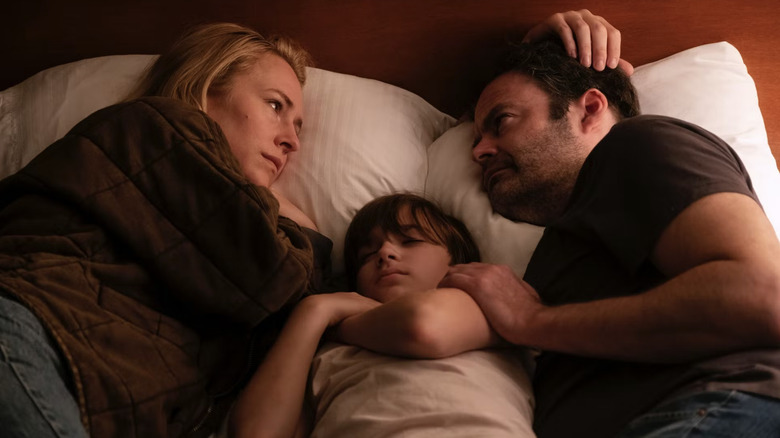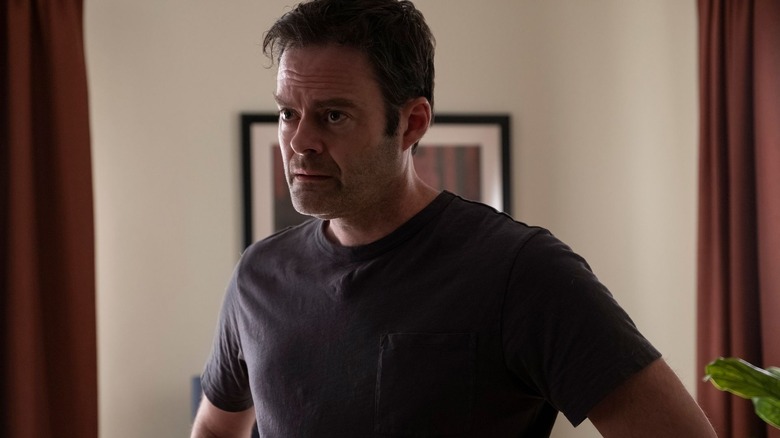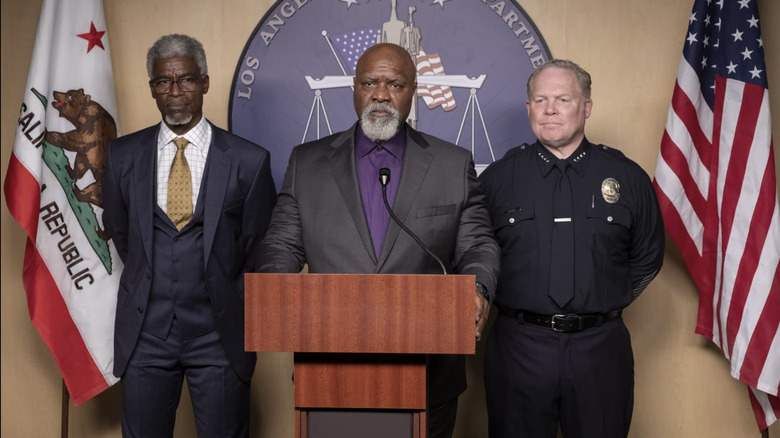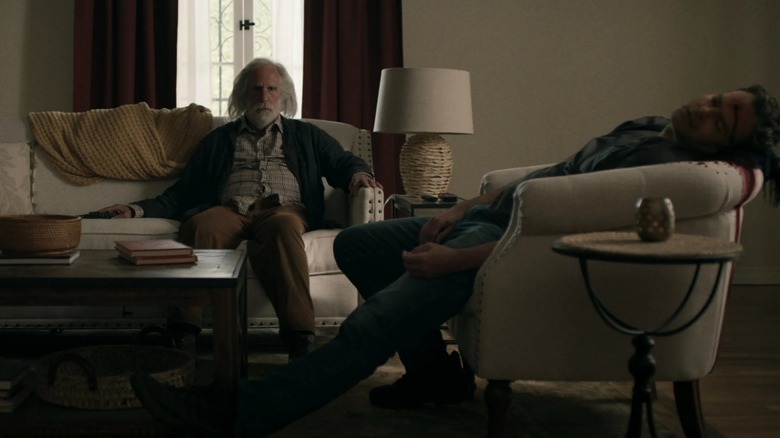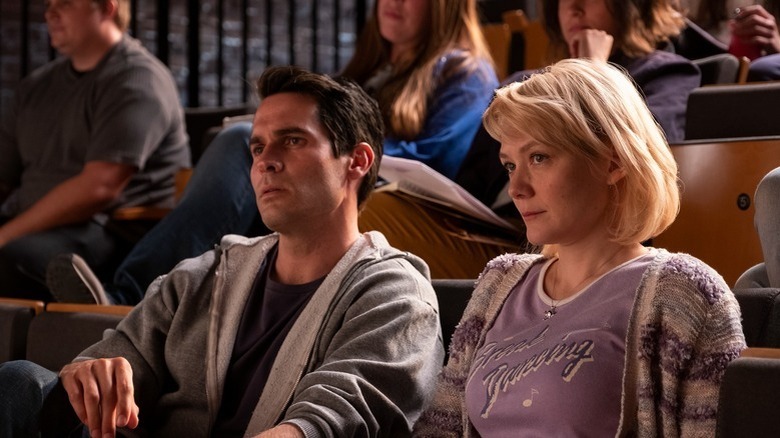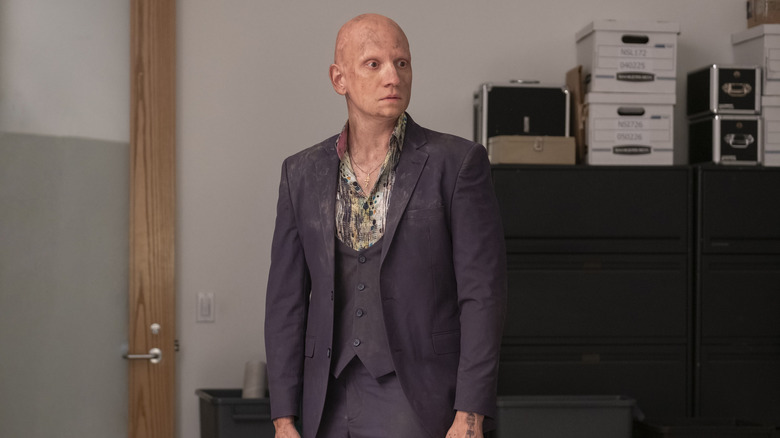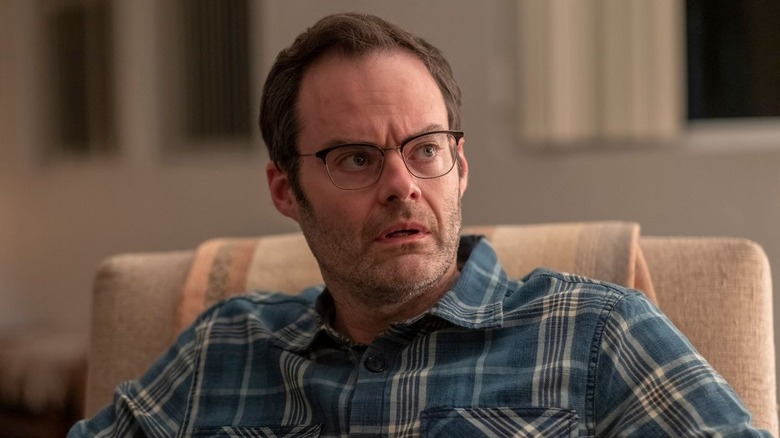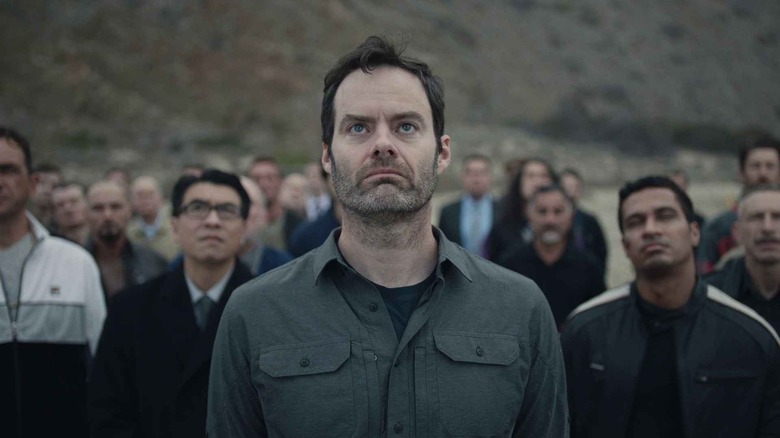Bill Hader Breaks Down Key Changes To The Barry Series Finale And What The Show Is Really About
HBO's ambitious, dark comedy/psychotic thriller series "Barry" finally came to a close, and the finale was not without its own set of twists and turns. The titular assassin ends up on the wrong end of a gun, but it's his killer whose final fate is worse than death. The unassuming acting teacher Gene Cousineau is the one to take the fall for Barry's crimes in the end.
But how did series creator and star Bill Hader, along with the other creatives on the show, come up with such a crazy ending? The truth is, lots of different versions were considered in and out of the writers' room, and it wasn't til the final edit that some of the biggest decisions of the series were set in stone. After giving the shocking finale some room to breathe, Hader revealed some of the alternate endings that were being considered, along with discussing the true meaning behind the show.
Barry almost didn't choose to turn himself in before getting shot
One crucial moment of the show's final episode almost didn't make it in — when Barry stands in Cousineau's apartment, just seconds before being shot, and comes to the conclusion that he should turn himself in. In fact, in an alternate version of the episode, Barry was the one who pinned his crimes on Cousineau in the first place. In an "early, early version," the ex-hitman "was much more involved" in framing his former acting teacher, Hader revealed to The Wrap.
"It was a whole thing where Jim Moss finally catches him and it's like Barry out-maneuvers Jim Moss in this interrogation battle," the series co-creator explained. "He tells him the truth about what happened but says he was manipulated. Basically, the movie that you see at the end, in an earlier draft, Barry tells Jim Moss that is what happened."
This wasn't the only iteration of events Hader had considered. In an even earlier version of the script, the writer drew a direct connection between Barry's false confession to Moss and the skills he'd learned from Cousineau in acting class. "He's using his acting," the "Saturday Night Live" alum said.
In most renditions of the script, Barry had no plans to face the music. It was actually not until a week before the scene was shot that Hader even had the idea. "[I]t just came to me right then, I was like, 'Oh, he should be turning himself in,' and [our producer] started laughing," Hader recounted. "She said, 'Oh my God, yeah, he turns himself in, and if Cousineau had just waited two seconds...'"
But even in a world where Barry "out-maneuvers" Jim and Cousineau, he still doesn't get away scot-free. Cousineau was killing him either way, but in an earlier iteration, Barry wasn't the acting teacher's only victim.
Jim Moss almost got killed too
In one version of the finale, Robert Wisdom's Jim Moss does not survive the episode, having been killed by Cousineau on a rampage. In this rendition, "[...] Barry goes to call Jim Moss and the police answer the phone and say, 'Jim Moss has just been killed,'" Hader recalled. "And then you hear a door open behind him and he turns around and it's Cousineau and Cousineau shoots him, so Cousineau shot Jim Moss and kills Barry."
Hader might have been gung-ho about the idea, but the other writers were much more hesitant to kill off such a major character, even in the show's final moments.
"I remember in the writers' room, everybody's like, 'Why do you have to kill Jim Moss?'" Hader recalled. The series co-creator was inspired by Dan White's assassination of Harvey Milk, "Like when someone goes insane like that it's like these are the two people who wronged me so I'm gonna kill them both," just as White killed Milk and San Francisco Mayor, George Moscone.
Luckily, the writers talked him out of this decision. Not only would Moss' death have been "needless," it wouldn't have felt as real, either. "It also became very 'TV' if that makes sense," the "SNL" alum added.
Even though Jim thought Cousineau was pulling Barry's strings, he still knew that the ex-hitman played a big part in his daughter's murder. In an earlier version of the script, Moss let Barry go after he framed his former acting teacher. Hader remembers other writers expressing their concern over this version of events, saying, "'I don't think Jim Moss would let him go,'" he recounted. "Even if he thought Barry was manipulated, he would bring them both down.'" This explains why Jim kidnaps Barry even after he starts to suspect Cousineau.
Barry's final line had variations
Having spent a storied tenure on the hit sketch comedy series "Saturday Night Live," Hader has definitely had his fair sure of experience with improv. Some might even say he could teach a master class for comedy on the fly. So when it came time to shoot his final moment as Barry, Hader wasn't thinking too much about the script. The actor-director decided to switch it up with every take, just to give himself and the other creatives some options in the cutting room.
In the final version, Barry is shot square in the head and says "Oh, wow," before dropping dead. This tiny line not only brings some much-needed comedy to a pretty dark episode but it is also imbued with all the emotion of that betrayal. Cousineau is the one to shoot me? "Oh, wow." And I was just about to turn myself in? "Oh, wow." And now any hope of redemption for him in the eyes of the people, and myself in the eyes of God, is totally gone? "Oh, wow."
Hader isn't quite sure, but he's pretty positive that this line was improvised. "I don't think that's in the script," he said. "I did a bunch of them. There are so many takes of me sitting down and looking up and going like, 'Huh' or 'You!' or 'Jesus' or 'Mr. Cousineau?' I think I did one where I finally got it and I went, 'Ohhhhh!' But everybody liked that read of just 'Oh, wow.'"
There were different versions of The Mask Collector movie
The final punchline in "Barry" is the highly fabricated Hollywood rendition of Barry's murder, called "The Mask Collector." The already-twisted version of events was filtered through the true crime entertainment industry to create a highly simplistic narrative. Since Cousineau was the one held responsible for Janice's murder, it was much more convenient for studio execs to paint him as a villainous mastermind than to explore the truth. Herein lies some of the comedy behind "The Mask Collector." However, the movie might not have been nearly as funny if Hader and the rest of the "Barry" team had chosen a slightly different route.
There were lots of "different versions of 'The Mask Collector,'" the star explained. "We did have a version where we would have had celebrities, well-known actors. I remember [cinematographer] Carl Herse, especially, saying, 'Please don't do that. It's been done to death.' And it would step on the idea, like 'Oh my God look they got all these cameos.'"
Besides this star-studded iteration, Hader also considered a more refined film that actually did explore the nuances of the case. "Then we had this idea where the movie was just a better-made film," Hader added. "More of an Oscar movie, a little bit more subtle about how bulls*** it is. Like a well-acted, well-written movie [...] and that just was not fun."
Instead, they settled on the most comedic interpretation they could think of, something that would fit the category of "mindless entertainment."
"'What's the most cynical version where a studio exec is like just make me money?'" Hader asked himself. "Like if you're on Amazon or Apple or whatever and it's like 99 cents, like a cheap thing. That was making me laugh more."
The first and last scene with Sally and Hank
Sally and Hank don't interact at all over the course of the series, representing two opposite ends of Barry's life, and their meeting doesn't take place until the very end of season 4. It felt like a major moment for Hader, and for the audience, but it wasn't too significant for either character.
"I was completely exhausted by the time I was writing episode 8, and this is what I mean by when you do fan service you f*** yourself — I had it in my head that the audience is going to be so excited Sally and Hank are meeting each other," Hader admitted. "What do these two characters have in common? He loves Barry and she loves what Barry did for her, so it's like an ex talking to the new girlfriend but maybe they find some sort of connection and sympathy for each other."
Towards the end of the episode, the two shared a poignant moment that was later cut and reshot. "So at the end when Hank is killed, in the initial version, Hank brings his hand up because he's dying, and then Sally took his hand and put it in Cristobal's hand as a way of being like, 'I'm gonna get you back with your guy' and all this stuff," the series creator revealed.
Anthony Carrigan and Sarah Goldberg, who play Hank and Sally, immediately took issue with this scene. "Sarah and Anthony, to their credit, were like, 'Why are we shooting this?'" Hader recalled. "And I was like, 'No, no, no this is good!'" It wasn't til he got into the editing room that Hader realized just how right his actors had been. The editor immediately tried cutting around the moment because it was "so stupid," but inevitably the entire scene had to be reshot.
Treating Barry like an alcoholic
A lot of the themes introduced in season 1 of "Barry" stay consistent throughout the series. One big analogy for the titular protagonist's little murdering problem has always been alcoholism, from the very beginning of the show until his final moments on-screen.
"We always looked at it in the form of like an alcoholic," the series creator explained. "The pilot is like an alcoholic going to AA, and then you're seeing he's drinking on the side, but trying to stick to it. And then by the end of season 1, he's like, 'I'm not gonna drink at all,' and he does a pretty good job."
A good job with the exception of Janice Moss, of course. But even after he kills Janice, Barry tries his best not to relapse again for a while. He manages to turn down every demand to kill again until the very end of season 2 when he "goes on a massive bender" and shoots up a gangster-filled monastery.
"So now it's like season 3 or 4 are about him being like, 'Yeah I'm gonna drink but let me see if I can keep my relationships even though I drink,'" Hader said. "But there is no 'I can't kill anybody anymore' after that. We did that. Now he's just accepted on some level that he's an alcoholic. And then he went to jail and got out so then he can drink some more."
A time jump reveals that Barry's life as a fugitive and a father has changed his relationship to murder once again. This time, he's reformed, but the backslide is an even harder fall. The idea was that he would fit the archetype of "a Christian and a good religious guy who used to drink," Hader explained. His final return to violence? A "'Leaving Las Vegas'-style" bender, of course.
What Barry is really about
This series has lots of moving parts, but one line from Barry's mentor-tormentor really sums up what the show is all about for Hader: "The only thing that will make you forget is by being someone else." For the series creator, "That's basically what the show is."
"That's what everyone is trying to do by being someone else, so they can forget that they hate themselves and what they've done," he revealed. "That's what the show ended up being about. It started out kind of hopeful, someone called it 'Breaking Good' [laughs]. By season 4 he can't be good so he's gotta be Clark and Sally's gotta be Emily and Fuches has gotta be The Raven and Cousineau has to be this monk, this weird wizard guy and Hank is a well-to-do philanthropist and businessman. And they're all lying to themselves."
Not every character succeeds at their act, but that's a good thing. Fuches pretends to be "a man with no heart," having been hardened by Barry's betrayal and almost a decade in prison. In the end, though, he reveals he does have a heart after all. Rather than allow Barry's child to perish in a shoot-out, he saves him and returns him to his father.
"Instead of exposing him to this violence and instead of exploiting him, he shields him from it," Hader pointed out. "It's like his little piece of redemption."
Not everyone keeps up their act at the end of "Barry," and some of them even die trying. But every character is a bit of a "mask collector" in their own right, even the ones that never took a day of acting class.
